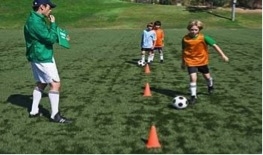Pep Clotet — the challenge ahead Saturday, 23rd Nov 2013 13:50 by waynekerr55 With the news that the club have gone continental with the appointment of Josep “Pep” Clotet I thought it would be an interesting time to discuss the challenges he faces and what path he may need to take to ensure that the club end up with a production line of talent ready to keep the club challenging at the level it currently finds itself at Tony Pennock — his legacy Let’s not forget that he did deliver category 2 status, something which other clubs have failed to deliver. Whilst he was youth team coach he did oversee the end of Ben Davies’ development, although it will be hard to judge him given that this year’s scholars were at the end of their under 11’s season. “Successful academies” Although this is a very subjective subject, it would be logical to argue that the following criteria should be applied to a club of our location and catchment area: - A Ben Davies style player ready to challenge for a first team place every other season as the bare minimum (>20 first team games) - At least 2 players of the calibre of Jazz Richards to provide cover for the squad but with the caveat that they can push on an develop every year (approximately 10 appearances) - Players also need to be technically proficient, tactically astute and possess a creative mind set, so that they can make decisions on their own and be trusted to fit into the team This is realistic as we have a large catchment area without a large amount of competition. To match these criteria, the key factors that need to be met are as follows: - Establish a clear philosophy of coaching across the academy and development centre - To undertake a long term view on player development in both coaching and recruitment - To move away from “isolated technical practice” to opposed practice in a “whole part whole” setting - To foster a creative coaching environment - To educate the parents on the philosophy and to help them understand what their child is doing Establishing a clear philosophy Speaking from experience, all too often at academies there is a lack of vision and strategy to the coaching process. Yes, I have read that the club preaches a playing from the back approach, but if we are to stay true to these roots then why are the under 18’s and 21’s running up and down sand dunes when they could be doing football practice to improve their performance? Taking a long term view Too often, scouts across the globe are “wowed by the biological” player who scores “biological” goals. What I mean is that as they are bigger than their peers, they stand out because they score lots of goals, whilst the smaller intelligent player is over looked. Jandir Zola was a prime example of this short termist approach and its failings. He was the archetypal “biological” player and he was told that he was the best thing since sliced bread. Yet as he got older his game intelligence suffered and as a consequence the opportunity to develop him was missed. Scouts and coaches need to differentiate between brain and brawn if we are to produce more talent. Isolated technical practices When has a cone ever tackled a player? When does a cone make a player have to think on their feet like they do in a game situation? If never is your thought then you’re probably correct. Many sessions I’ve seen (and even done!) in the past have looked pretty but in reality have done little to improve the quality of the players. Coaches must not be afraid to have messy sessions that are littered with mistakes in the short term if it ultimately improves the players thought processes and improves their technical ability. The mantra must be: To foster a creative coaching culture As mentioned coaches must be able to coach players and must not let them fear making the wrong choice, as long as they learn from these mistakes. Again, opposed practices are key as they provide the 1 v 1, 2 v 1, 1 v 2 situations where players have to solve the problems as they would in the game. Players can also be taken out of these situations to practice their technique, so that the weaker players can be challenged but the stronger players continue to challenge each other in the opposed environment. As with teaching: Educating the parents Ben Davies, Joe Allen and Emyr Huws (now of Manchester City) all share a common characteristic, that being that their parents supported them and did not interfere in their child’s development. They didn’t give it the “I’ve got a coaching badge you know? I know more than you!” act. However it is a clubs duty to explain that there is a 5% chance of their child being a scholar, and less than 1% of players will become professionals. They must let the children and parents know why they are doing what they are doing and maintain open dialect, so that the destructive talks and the poisonous discussions are minimised, thus maintaining a positive learning environment. Moving forward To ensure the above factors are implemented, there needs to be a significant investment in the staff. Robust recruitment of coaches and scouts who “understand” player development and robust CPD to keep them up to date with developments in skills learning literature are a must. The “jobs for the boys” culture must be smashed, although this is not exclusive to our club. Only then will we reap the rewards as many Bundesliga clubs have and Southampton, who have been a model of player development in the past decade or so Photo: Action Images Please report offensive, libellous or inappropriate posts by using the links provided.
You need to login in order to post your comments |
Arsenal Polls |
